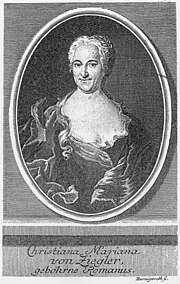Sie werden euch in den Bann tun, BWV 183
They will put you in doing the spell ( BWV 183 ) is a church cantata by Johann Sebastian Bach. He composed it in Leipzig for Exaudi, the Sunday after Ascension, and performed it on May 13, 1725 for the first time on.
With the same Bible word another cantata Bach on the same occasion from 1724, which is conducted as BWV 44 starts.
History and words
Bach wrote the cantata in his second year in Leipzig for the Sunday Exaudi and performed it on May 13, 1725 for the first time on. In his second year in Leipzig Bach had consistently composed chorale cantatas in his second cantata cycle to the Palm Sunday from the first Sunday after Trinity, but was passed over for Easter again cantatas on freer textual basis. These included nine cantatas on texts of the poet Christiana Mariana von Ziegler, the cantata for Exaudi. Later Bach arranged them like most of the nine his third cantata cycle.
The prescribed readings for the feast day were 1 Peter 4:8-11 and Jn 15:26 LUT LUT LUT to Jn 16.4 of the farewell discourses of Jesus, the promise of the Holy Spirit as the Paraclete and the announcement of persecution. The poet begins the cantata with the same biblical quotation from John 16:2 LUT, which was a year before 44 used in the text of an unknown poet of the cantata BWV for the same reason. It emphasizes the fearlessness that is possible for a person who relies on " Jesus protective arm ". In sets 2 and 3, it refers to the announced support. The final chorale is the fifth verse of Paul Gerhardt, Go in to thy gates.
Scoring and structure
The cantata is staffed with four soloists, soprano, alto tenor and bass, four-part choir in the final chorale, an unusual oboe choir of two oboe da caccia, two oboe d'amore, two violins, viola, violoncello piccolo and continuo.
Music
Bach, the Jesus Word of the beginning, " They shall put you out of the synagogue, but What matters the time that whoever kills you will think that he doeth God service " ( John 16:2 LUT after the final edition hand), the bass as the Vox Christi ( voice of Christ ), while he had designed the two sets of verse one year earlier than two piece set, as a duet, which an excited chorus set was compared. In this cantata he puts the Bible citation as a recitative of only five cycles. It is as meaningful accompanied by two oboes and two oboes d'amore caccia over a pedal point of the continuo. In the first aria, which negates the fear of the fear of death, plays a violoncello piccolo incessant runs. Theorem 3 is again accompanied recitative, whose company has designed more complex Bach: The strings hold chords long while alternately the oboes repeat a motif of four notes, which is sung by the Old to the words "I'm ready ". The second aria is accompanied as caccia in unison by the strings and oboes, thereby obtaining both arias staining by instruments in the low register. The cantata will be decided by a four -part harmony to the melody Help me praise god goodness.
Recordings
- The Bach Cantata Vol 36, Helmuth Rilling, Gächinger Kantorei, Bach-Collegium Stuttgart, Arleen Augér, Julia Hamari, Peter Schreier, Walter Held wine, Haenssler 1981
- J. S. Bach: The cantatas - Sacred Cantatas Vol 10, Nikolaus Harnoncourt, Tölz Boys Choir, Concentus Musicus Wien, soloist of the Tölz Boys Choir, Paul Esswood, Kurt Equiluz, Thomas Hampson, Teldec 1988
- J. S. Bach: Cantatas with violoncello piccolo ( Vol. 2), Christophe Coin, The Leipzig Concerto Vocale, Ensemble Baroque de Limoges, Barbara Schlick, Andreas Scholl, Christoph Prégardien, Gotthold Schwarz, Auvidis Astrée 1994
- Bach Cantatas Vol 25: Dresden / Sherborne, John Eliot Gardiner, Monteverdi Choir, English Baroque Soloists, Joanne Lunn, Daniel Taylor, Paul Agnew, Panagiotis Iconomou, Soli Deo Gloria 2000
- J. S. Bach: Complete Cantatas Vol 15, Ton Koopman, Amsterdam Baroque Orchestra & Choir, Deborah York, Bogna Bartosz, Jorg Dürmüller, Klaus Mertens, Antoine Marchand 2001
- J. S. Bach: Cantatas Vol 39, Masaaki Suzuki, Bach Collegium Japan, Carolyn Sampson, Robin Blaze, Gerd Türk, Peter Kooij, TO 2007










